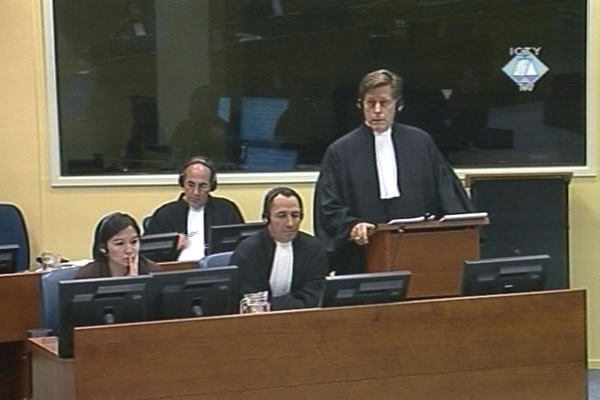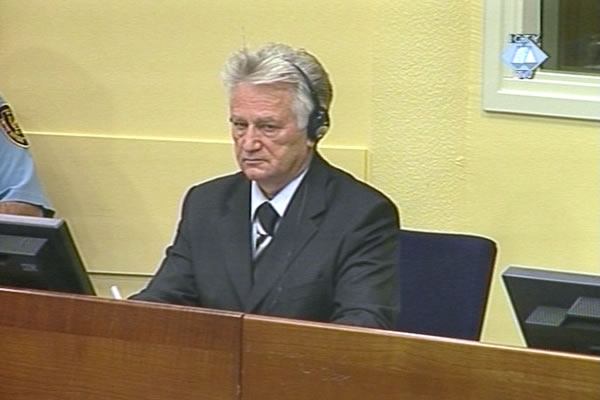Home
PROSECUTION ON PERISIC: ‘SHADOW WARRIOR’
In his closing argument, prosecutor Mark Harmon described General Momcilo Perisic as ‘a shadow warrior’ who aided and contributed to the crimes ‘from his office’ in Belgrade, hiding behind a facade of denial of the FRY leadership which claimed that the FRY was not involved in any way in the conflicts in BH and Croatia. The minutes of the meetings of the FRY Supreme Defense Council were discussed for the first time in public today
 Mark Harmon, heading the prosecution team in the Perisic case
Mark Harmon, heading the prosecution team in the Perisic case Former chief of the VJ General Staff Momcilo Perisic was a ‘shadow warrior, hiding behind the facade of denial put up by the leadership in Belgrade, who claimed that the FRY wasn’t involved in the conflict in Bosnia’. This is how prosecutor Mark Harmon opened his closing argument in the trial in which the prosecution is trying to shed light on the role the FRY and its army played in the wars in Croatia and Bosnia and Herzegovina.
In 13 counts, the indictment charges General Perisic with crimes against humanity and violations of laws and customs of war he allegedly committed by ‘providing substantial contribution’ to the campaign of artillery and sniper attacks in Sarajevo that lasted for years, mass executions after the fall of Srebrenica in July 1995 and rocket attacks on Zagreb in early May 1995. Perisic was appointed chief of the VJ General Staff in August 1993 and remained at that post until the end of the war in BH in 1995.
According to the prosecution, Perisic aided and contributed to the crimes listed in the indictment ‘from his office in Belgrade’. Victims ‘were not in Perisic’s field of vision’ and were not a ‘part of the equation Perisic considered when he implemented the policies of his leaders’, the prosecutor noted.
Prosecutor Mark Harmon continued his closing argument by recalling the Bosnian Serbs’ strategic goals; the separation of ethnic communities, the removal of the border on the Drina river and the division of Sarajevo are particularly relevant for Perisic’s case. According to the excerpts from Ratko Mladic’s diaries, Perisic was aware of the Bosnian Serbs’ strategic goals, the prosecutor noted. The VJ was helping implement them before the accused was appointed chief of the General Staff and continued doing so after Perisic’s appointment. As the prosecutor put it, this indicates there was a ‘continuity of policy and decisions’.
According to the prosecutor, General Perisic provided support to the VRS, knowing full well that the support would be used to commit crimes. This prompted Judge Moloto to ask if the commanders of the armies which contribute troops to the NATO-led operation in Afghanistan were responsible for ‘aiding and abetting’ the crimes allegedly perpetrated in that war. Although prosecutor Harmon remarked that this was an ‘explosive political issue’, he did note there was a difference: NATO troops are taking part in a military campaign against the Taliban and not in the forcible transfer of 25,000 to 35,000 women, children and the elderly, unlike the VRS in Srebrenica, who were involved in precisely such an operation, as the prosecution alleges.
The prosecutor also insisted on General Perisic’s role in establishing the 30th and 40th Personnel Center. The centers ‘were there to solve the VRS’s key need for personnel’ and were used to regulate the status of Yugoslav officers serving in the VRS and the SVK. In March 1993, Ratko Mladic sent a letter to Perisic’s predecessor, urging him to deal with the personnel problems. Some months later, Perisic relayed Mladic’s request at a meeting of the Supreme Defense Council and as a result, the two personnel centers were set up to regulate the service of VJ members in the VRS and the SVK.
For the first time today, the prosecutor read in public parts of the minutes of the Supreme Defense Council meetings, which had until now been discussed only in closed session. Last Friday, the Trial Chamber lifted the seal from a number of documents, including the minutes of the Supreme Defense Council. The Tribunal received the materials for the Slobodan Milosevic trial. As the prosecutor said, the contents of those documents prove that the Supreme Defense Council, the VJ and other Serbian forces played a role in the wars in Croatia and Bosnia and Herzegovina.
As the hearing drew to a close, prosecutor Barney Thomas urged the Trial Chamber to take into consideration ‘the totality of evidence’ about the logistical and financial support the VJ gave the VRS. According to Thomas, witness testimonies and exhibits show clearly that the ‘FRY policy was to provide help to Republika Srpska and the Republic of Serbian Krajina in weapons, ammunition and other logistic support’. General Perisic was given powers to facilitate this support, which was ‘substantial and of key importance’ for the wars in BH and Croatia.
The prosecution will continue its closing argument tomorrow.
Photos
Linked Reports
- Case : Perisic
- 2011-03-25 ICTY LIFTS SEAL FROM SUPREME DEFENSE COUNCIL DOCUMENTS IN MOMCILO PERISIC CASE
- 2011-01-11 GENERAL PERISIC’S DEFENSE RESTS ITS CASE
- 2010-11-05 PROSECUTOR: EXPERT REPORT BASED ON INACCURATE DATA
- 2011-03-29 PROSECUTOR SEEKS LIFE IN PRISON FOR GENERAL PERISIC
- 2011-03-30 THE DIFFERENCE BETWEEN REALITY AND FICTION
- 2011-03-31 DEFENSE CALLS FOR GENERAL PERISIC’S ACQUITTAL

